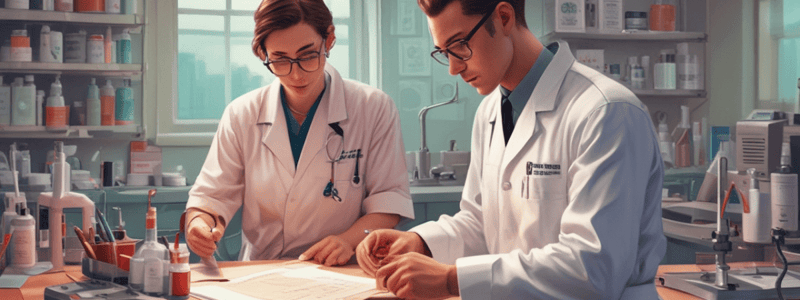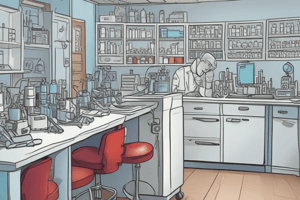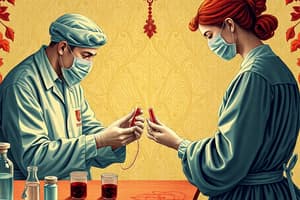Podcast
Questions and Answers
What is the first step in drawing blood from a patient?
What is the first step in drawing blood from a patient?
- Place a tourniquet and clean the area with an alcohol wipe
- Identify the vein that will be used
- Gather needed supplies and perform hand washing techniques
- Discuss the procedure with the patient and confirm their name and tests being drawn (correct)
Which vein is the most commonly used for drawing blood?
Which vein is the most commonly used for drawing blood?
- Median basilic vein
- Median cephalic vein
- Brachial vein
- Antecubital fossa vein (correct)
What is the primary function of the kidneys in the body?
What is the primary function of the kidneys in the body?
- To regulate blood sugar levels
- To store nutrients for energy production
- To produce hormones for growth and development
- To filter waste products from the blood (correct)
What is a common symptom of Urinary Tract Infection (UTI)?
What is a common symptom of Urinary Tract Infection (UTI)?
What is the primary characteristic of Diabetes?
What is the primary characteristic of Diabetes?
What is the purpose of the tourniquet in the blood-drawing process?
What is the purpose of the tourniquet in the blood-drawing process?
What is the term for a medical doctor who specializes in interpreting medical images?
What is the term for a medical doctor who specializes in interpreting medical images?
What is the correct pathway of blood through the circulatory system?
What is the correct pathway of blood through the circulatory system?
What is the term for a White Blood Cell (WBC)?
What is the term for a White Blood Cell (WBC)?
What is the function of the spleen and liver in the circulatory system?
What is the function of the spleen and liver in the circulatory system?
What is the mineral necessary for normal hemoglobin production?
What is the mineral necessary for normal hemoglobin production?
What is the term for a blood vessel getting smaller?
What is the term for a blood vessel getting smaller?
What is the composition of plasma?
What is the composition of plasma?
What is the shape of a Red Blood Cell (RBC)?
What is the shape of a Red Blood Cell (RBC)?
What does a dark yellow color of urine indicate?
What does a dark yellow color of urine indicate?
What is the function of one-way valves in veins?
What is the function of one-way valves in veins?
What imaging method is used in a mammogram?
What imaging method is used in a mammogram?
Which of the following imaging techniques is used to diagnose gallbladder disease?
Which of the following imaging techniques is used to diagnose gallbladder disease?
What is the purpose of the probe in an echocardiogram?
What is the purpose of the probe in an echocardiogram?
What is the duration of a PET scan?
What is the duration of a PET scan?
What age group is recommended to get mammograms every year?
What age group is recommended to get mammograms every year?
What is the imaging method used in an echocardiogram?
What is the imaging method used in an echocardiogram?
What is a common symptom of uncontrolled diabetes?
What is a common symptom of uncontrolled diabetes?
What is the primary function of the kidneys in the urinary system?
What is the primary function of the kidneys in the urinary system?
What is the name of the genetic disorder that impairs blood clotting?
What is the name of the genetic disorder that impairs blood clotting?
What is the role of the atria in the heart?
What is the role of the atria in the heart?
What is the name of the infection that can occur in the urinary system?
What is the name of the infection that can occur in the urinary system?
What is the role of the phlebotomist in diagnostic and imaging services?
What is the role of the phlebotomist in diagnostic and imaging services?
What is the name of the hormone that is detected in pregnancy tests?
What is the name of the hormone that is detected in pregnancy tests?
What is the name of the condition that occurs when there is a buildup of plaque in the arteries?
What is the name of the condition that occurs when there is a buildup of plaque in the arteries?
What is the role of the clinical laboratory technician?
What is the role of the clinical laboratory technician?
What is the name of the inherited disorder that affects hemoglobin production?
What is the name of the inherited disorder that affects hemoglobin production?
What is the main function of the atria in the heart?
What is the main function of the atria in the heart?
What is the purpose of the one-way valves in the blood vessels?
What is the purpose of the one-way valves in the blood vessels?
What is the percentage of solid cells or formed elements in blood?
What is the percentage of solid cells or formed elements in blood?
What is the primary function of erythrocytes?
What is the primary function of erythrocytes?
What is the name of the largest artery in the body?
What is the name of the largest artery in the body?
What is the purpose of the capillary beds?
What is the purpose of the capillary beds?
Which imaging method uses magnetic fields and radio waves to create detailed images of organs and tissues?
Which imaging method uses magnetic fields and radio waves to create detailed images of organs and tissues?
What is the average blood volume of a 70 kg male?
What is the average blood volume of a 70 kg male?
What is the purpose of leukocytes in the blood?
What is the purpose of leukocytes in the blood?
What is the smallest and most numerous type of blood vessel?
What is the smallest and most numerous type of blood vessel?
What is the primary purpose of identifying the vein before drawing blood?
What is the primary purpose of identifying the vein before drawing blood?
What is a common symptom of renal failure?
What is a common symptom of renal failure?
What is the purpose of cleaning the area with an alcohol wipe before drawing blood?
What is the purpose of cleaning the area with an alcohol wipe before drawing blood?
What is the primary characteristic of kidney stones?
What is the primary characteristic of kidney stones?
What is the purpose of inserting the needle at a 30-degree angle during phlebotomy?
What is the purpose of inserting the needle at a 30-degree angle during phlebotomy?
What is the purpose of labeling the tubes after drawing blood?
What is the purpose of labeling the tubes after drawing blood?
What does the presence of ketones in urine indicate?
What does the presence of ketones in urine indicate?
What is the role of the veins in the circulatory system?
What is the role of the veins in the circulatory system?
What does the presence of glucose in urine indicate?
What does the presence of glucose in urine indicate?
What is the role of the ureters in the urinary system?
What is the role of the ureters in the urinary system?
What is the role of the pharmacist?
What is the role of the pharmacist?
What does the presence of proteins in urine indicate?
What does the presence of proteins in urine indicate?
What is the role of the clinical laboratory technician?
What is the role of the clinical laboratory technician?
What is the name of the inherited disorder that affects hemoglobin production?
What is the name of the inherited disorder that affects hemoglobin production?
What is the role of the phlebotomist?
What is the role of the phlebotomist?
What is the name of the hormone detected in pregnancy tests?
What is the name of the hormone detected in pregnancy tests?
What is the purpose of the ventricles in the heart?
What is the purpose of the ventricles in the heart?
What is the function of the aorta?
What is the function of the aorta?
What is the primary function of erythrocytes?
What is the primary function of erythrocytes?
What is the purpose of the capillary beds?
What is the purpose of the capillary beds?
What is the average blood volume of a 70 kg male?
What is the average blood volume of a 70 kg male?
What is the purpose of leukocytes in the blood?
What is the purpose of leukocytes in the blood?
What is the function of the atria in the heart?
What is the function of the atria in the heart?
What is the purpose of the one-way valves in the blood vessels?
What is the purpose of the one-way valves in the blood vessels?
What is the imaging method used in an MRI?
What is the imaging method used in an MRI?
What is the smallest and most numerous type of blood vessel?
What is the smallest and most numerous type of blood vessel?
What is the primary function of arteries in the circulatory system?
What is the primary function of arteries in the circulatory system?
What is the difference between the walls of arteries and veins?
What is the difference between the walls of arteries and veins?
What is the term for a red blood cell?
What is the term for a red blood cell?
What is the purpose of the spleen and liver in the circulatory system?
What is the purpose of the spleen and liver in the circulatory system?
What is the composition of plasma?
What is the composition of plasma?
What is the term for a blood vessel getting smaller?
What is the term for a blood vessel getting smaller?
What is the function of capillary beds?
What is the function of capillary beds?
What is the difference between the color of arteries and veins?
What is the difference between the color of arteries and veins?
What does an orange or red color of urine indicate?
What does an orange or red color of urine indicate?
What is the primary function of radiologists?
What is the primary function of radiologists?
What is the primary function of an echocardiogram?
What is the primary function of an echocardiogram?
What is the imaging method used in a PET scan?
What is the imaging method used in a PET scan?
What is the recommended frequency for mammograms for women aged 45 to 54?
What is the recommended frequency for mammograms for women aged 45 to 54?
What is the education level required for a clinical laboratory technician?
What is the education level required for a clinical laboratory technician?
What is the purpose of a radiotracers in a PET scan?
What is the purpose of a radiotracers in a PET scan?
What is the duration of an echocardiogram?
What is the duration of an echocardiogram?
What is the education level required for a radiologist?
What is the education level required for a radiologist?
What is the imaging method used in a mammogram?
What is the imaging method used in a mammogram?
What is the primary function of a phlebotomist in diagnostic and imaging services?
What is the primary function of a phlebotomist in diagnostic and imaging services?
What is the duration of a PET scan?
What is the duration of a PET scan?
Study Notes
Phlebotomy Steps in Drawing Blood
- Discuss with the patient what you will be doing and why, confirm patient name and tests being drawn
- Identify the vein to be used (most common: antecubital fossa, median cephalic, and median basilic veins)
- Gather needed supplies, perform hand washing, and put on gloves
- Place a tourniquet and clean the area with an alcohol wipe for 30 seconds
- Insert the beveled needle at a 30-degree angle into the vessel
- Connect the vacutainers or use a syringe to draw back once blood is seen in the tubing
- Properly label the tubes and send them to the laboratory for analysis
- Clean up the space and ensure all sharps are placed in a properly labeled sharps container
Renal Failure and Associated Conditions
- Decreased kidney function leading to inability to filter waste products from blood
- Symptoms: fatigue, swelling, changes in urination frequency
- Related conditions:
- Kidney stones: hard deposits formed in the kidneys from minerals and salts
- Symptoms: severe pain in the back, side, or lower abdomen, nausea, blood in urine
- Urinary tract infection (UTI): bacterial infection in the urinary tract
- Symptoms: frequent urination, burning sensation during urination, cloudy or bloody urine
- Diabetes: metabolic disorder with high blood sugar levels
- Symptoms: increased thirst, frequent urination, unexplained weight loss
- Pregnancy: prone to UTIs due to hormonal changes and pressure on the bladder
- Symptoms: frequent urination, discomfort or pain during urination, cloudy or bloody urine
- Kidney stones: hard deposits formed in the kidneys from minerals and salts
Diagnostic Factors in Urine Testing
- Ketones: high levels of blood acids indicate increased fat metabolism, possibly due to diabetes or fasting
- Proteins: presence in urine may indicate kidney damage or disease, dehydration, infection, or certain medications
- Glucose: presence in urine may indicate high blood sugar levels, often seen in uncontrolled diabetes
- hCG (Human Chorionic Gonadotropin): presence indicates pregnancy, used in pregnancy tests
- Patient history: provides insights into past medical conditions, medications, lifestyle habits, and family history
- Vital signs: blood pressure, heart rate, respiratory rate, and temperature, which may indicate systemic issues or organ dysfunction
- Color and odor: changes in urine can provide clues about hydration levels, dietary habits, and certain medical conditions
- Dark urine: dehydration
- Foul-smelling urine: infection
- Orange or red urine: blood in the urine (hematuria), possibly due to kidney damage or parasitic infection
- Fruity odor: presence of ketones, indicating diabetes or starvation
- Cloudy urine: bacterial infection or UTI
Circulation and Body Defense
- Anatomy of the Heart:
- Atria: upper chambers receiving blood
- Ventricles: lower chambers pumping blood out of the heart
- Blood Vessels:
- Arteries: carry oxygen-rich blood away from the heart
- Veins: return oxygen-depleted blood to the heart
- Capillaries: tiny blood vessels where gas exchange occurs
- Blood:
- Plasma: liquid portion containing water, proteins, and other solutes
- Cells: red blood cells (RBCs), white blood cells (WBCs), and platelets
- Conditions:
- Anemia: decreased red blood cell count or hemoglobin levels
- Leukemia: cancer of the blood-forming tissues
- Hemophilia: genetic disorder impairing blood clotting
- Sickle Cell Anemia: inherited disorder causing abnormal hemoglobin production
- Atherosclerosis: buildup of plaque in the arteries, narrowing blood flow
Urinary System
- Kidneys: filter waste from blood, regulate electrolyte balance and blood pressure
- Ureters: tubes transporting urine from kidneys to the bladder
- Bladder: stores urine
- Urethra: tube through which urine exits the body
- Conditions:
- UTI: bacterial infection in the urinary system
- Kidney stones: hard deposits formed in the kidneys
- Renal failure: decreased kidney function leading to waste buildup in the body
Laboratory Professionals and Diagnostic Services
- Clinical Laboratory Technician: conducts laboratory tests, prepares specimens, analyzes results, and reports findings to medical staff
- Pharmacist: dispenses medications, provides patient education, and reviews prescriptions for accuracy and potential drug interactions
- Pharmacy Technician: assists pharmacists in dispensing medications and managing inventory, processes prescriptions, labels medication, and handles customer inquiries
- Phlebotomist: collects blood samples for laboratory testing, ensures proper labeling and handling of specimens
- Radiologist: medical doctor specializing in interpreting medical images, provides diagnostic reports to referring physicians
- Radiographer: operates imaging equipment to produce diagnostic images, positions patients correctly and ensures image quality
Studying That Suits You
Use AI to generate personalized quizzes and flashcards to suit your learning preferences.
Description
Study the steps involved in drawing blood safely and efficiently. Learn how to prepare patients, identify the right veins, and gather necessary supplies. Master the skills required for phlebotomy procedures.




